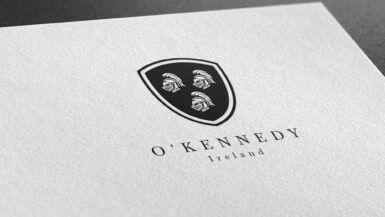The Bennett surname, with its deep roots in Irish history, originated from the medieval name Benedict. This name stems from the Latin “Benedictus,” meaning “well-spoken of” or “blessed.” The English spelling of the Anglo-Norman name Ben[n]et, and its modern French counterparts Benoît (first name) and Bénet (surname), showcases the linguistic evolution of this distinguished name.
Etymology and Meaning
Bennett, as an English adaptation, carries the same connotations of blessings and favorable speaking as its Latin progenitor. Its link to religious and cultural reverence is undeniable, reflecting a historical era where names were often inspired by desired virtues and qualities.
Earliest Known Usage
The earliest public record of the Bennett surname dates back to 1208 in County Durham, North East England. This early appearance signifies the surname’s long-standing presence and influence within British and Irish territories.
Geographic Distribution
Original Geographic Location
In Ireland, the Bennett name morphed into an Irish rendition, Beinéid, particularly prevalent in South Leinster. This variation reflects the linguistic and cultural assimilation of the name within Irish society.
Migration Patterns
The Bennett surname saw widespread migration, with significant appearances in Ulster, Northern Ireland. Here, the name evolved into “MacBennett,” particularly in counties like Monaghan, Down, and Tyrone.
Historical Context
Notable Historical Events
The Bennett family name has been interwoven with various historical events and movements, both within Ireland and beyond. Its presence during key moments in Irish history reflects its bearers’ involvement in societal and political changes.
Involvement in Key Moments in History
From medieval times through the tumultuous periods of Irish history, the Bennett name has been part of significant historical narratives, including political upheavals and cultural shifts.
Notable Irish Bearers of the Surname
Famous Individuals
Claire-Louise Bennett, a contemporary Irish author, and Thomas Westropp Bennett (1867–1962), an influential Irish politician, magistrate, and public figure, are among the notable bearers of the Bennett surname, showcasing the name’s continued relevance and prominence in Irish society.
Variations of the Surname
Spelling Variations
Bennett, as a surname, has experienced various spelling adaptations, including Bennet, Benett, and the Gaelic MacBennett, demonstrating its linguistic flexibility and regional influences.
Regional Differences
The variations in the Bennett surname reflect the diverse linguistic landscapes of Ireland and Britain, adapting to local dialects and cultural nuances.
Current Statistics and Distribution
Frequency and Global Distribution
The Bennett surname remains numerous in all Irish provinces, especially in Ulster, showcasing its widespread appeal and enduring legacy in Irish society.
Changes Over Time
Over time, the Bennett name has maintained a significant presence in Ireland and abroad, reflecting migration patterns and cultural influences.
Family Coat of Arms
The Bennett family coat of arms features a quartered shield, symbolizing unity and strength. The first and fourth quarters, silver with two red bars within a black bordure engrailed, represent perseverance and resilience. The second and third quarters, blue with three silver plates, signify loyalty and integrity. The combination of these elements depicts the family’s values and historical legacy.
Meaning of Elements
- Silver Shield with Red Bars: Symbolizes peace and sincerity, coupled with warrior-like strength.
- Black Bordure Engrailed: Represents the trials and challenges the family has overcome.
- Blue Background with Silver Plates: Denotes truth and loyalty, essential virtues of the family.
Motto
The family motto, “Bene tenax” (Rightly tenacious), encapsulates the enduring and resilient spirit of the Bennett family, underlining their commitment to holding true to their values and heritage throughout history.






Leave a reply